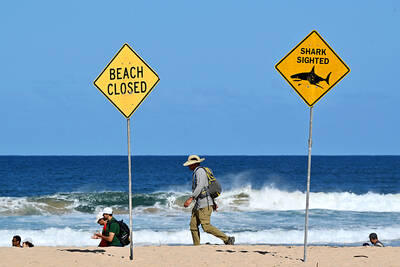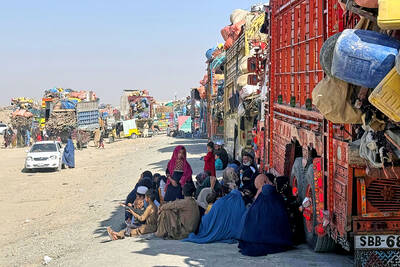Top officials from Australia, Japan, the US, China, Korea and India meeting in Sydney yesterday talked up technologies that could slow climate change but disappointed environmental lobby groups by failing to set targets for reducing the greenhouse gas emissions that cause global warming.
The first meeting of the Asia Pacific Partnership on Clean Development and Climate wound up with pledges of hundreds of millions of dollars to develop low-emission technologies for industry but no obligation or incentives for industrialists to use them.
Australian Prime Minister John Howard, addressing government officials and captains of industry, closed the two-day gathering with the hope that companies would do the right thing and put the planet ahead of profits.
"Without the active partnership with the business community we are not going to achieve our goal," Howard told the assembly.
Representatives of environmental lobby groups were denied seats at a conference they said was a charade put on by Australia and the US to deflect criticism of their failure to honor a commitment they made in Japan in 1997 and ratify the Kyoto Protocol on climate change.
Kyoto, now in effect after being ratified by 157 countries, sets legally binding emissions-reduction targets for 35 rich countries.
Poorer countries have promised to follow with their own cuts at a later stage.
The US and Australia, respectively the world's biggest polluter and the world's biggest polluter on a per capita basis, are the only two rich countries not to have ratified a pact that obliges signatories to cut emissions an average of 5.2 per cent below 1990 levels by 2012.
Australia relies on coal for 77 percent of energy generation and is the world's biggest coal exporter. The US, alone responsible for around a quarter of emissions of carbon dioxide, shares Australia's view that Kyoto is unfair because developing countries like China and India weren't given emission-reduction targets at the outset.
Howard pledged to spend A$100 million (US$75 million) on green energy projects over the next five years. Sam Bodman, the US energy secretary, announced an outlay of US$52 million on green energy in 2007.
Most of that money is expected to go to companies exploring ways of burying the carbon emissions from coal-burning power stations.
The Sydney-based Nature Conservation Council (NCC) slammed the delegates for lacking the political will to properly address climate change.
NCC director Cate Faehrmann said that shirking emissions targets, and refusing to follow the lead of the EU and set up a carbon-credit trading scheme, was tantamount to granting a "license for government and business to do nothing."
She added: "Without any incentive or penalties there is no reason for industry to move away from burning pollution coal and oil."
Demonstrators outside the meeting echoed Faehrmann's view that the partners were either naive or delusional in their optimism that companies would volunteer to adopt low-emission technologies that would add mightily to the cost of their products and willingly hand their rivals a huge advantage.
The Greens' Christine Milne, a member of the Australian parliament, told protesters outside the hotel that tackling climate change was should be the work of governments.
"There has been nowhere in the world where business has taken the lead unless you put in place a regulatory framework to make them do that," she said.
But hope springs eternal and chief US delegate Bodman told reporters that industrialists didn't need orders or incentives to switch to cleaner technologies.

With much pomp and circumstance, Cairo is today to inaugurate the long-awaited Grand Egyptian Museum (GEM), widely presented as the crowning jewel on authorities’ efforts to overhaul the country’s vital tourism industry. With a panoramic view of the Giza pyramids plateau, the museum houses thousands of artifacts spanning more than 5,000 years of Egyptian antiquity at a whopping cost of more than US$1 billion. More than two decades in the making, the ultra-modern museum anticipates 5 million visitors annually, with never-before-seen relics on display. In the run-up to the grand opening, Egyptian media and official statements have hailed the “historic moment,” describing the

SECRETIVE SECT: Tetsuya Yamagami was said to have held a grudge against the Unification Church for bankrupting his family after his mother donated about ¥100m The gunman accused of killing former Japanese prime minister Shinzo Abe yesterday pleaded guilty, three years after the assassination in broad daylight shocked the world. The slaying forced a reckoning in a nation with little experience of gun violence, and ignited scrutiny of alleged ties between prominent conservative lawmakers and a secretive sect, the Unification Church. “Everything is true,” Tetsuya Yamagami said at a court in the western city of Nara, admitting to murdering the nation’s longest-serving leader in July 2022. The 45-year-old was led into the room by four security officials. When the judge asked him to state his name, Yamagami, who

DEADLY PREDATORS: In New South Wales, smart drumlines — anchored buoys with baited hooks — send an alert when a shark bites, allowing the sharks to be tagged High above Sydney’s beaches, drones seek one of the world’s deadliest predators, scanning for the flick of a tail, the swish of a fin or a shadow slipping through the swell. Australia’s oceans are teeming with sharks, with great whites topping the list of species that might fatally chomp a human. Undeterred, Australians flock to the sea in huge numbers — with a survey last year showing that nearly two-thirds of the population made a total of 650 million coastal visits in a single year. Many beach lovers accept the risks. When a shark killed surfer Mercury Psillakis off a northern Sydney beach last

‘NO WORKABLE SOLUTION’: An official said Pakistan engaged in the spirit of peace, but Kabul continued its ‘unabated support to terrorists opposed to Pakistan’ Pakistan yesterday said that negotiations for a lasting truce with Afghanistan had “failed to bring about a workable solution,” warning that it would take steps to protect its people. Pakistan and Afghanistan have been holding negotiations in Istanbul, Turkey, aimed at securing peace after the South Asian neighbors’ deadliest border clashes in years. The violence, which killed more than 70 people and wounded hundreds, erupted following explosions in Kabul on Oct. 9 that the Taliban authorities blamed on Pakistan. “Regrettably, the Afghan side gave no assurances, kept deviating from the core issue and resorted to blame game, deflection and ruses,” Pakistani Minister of